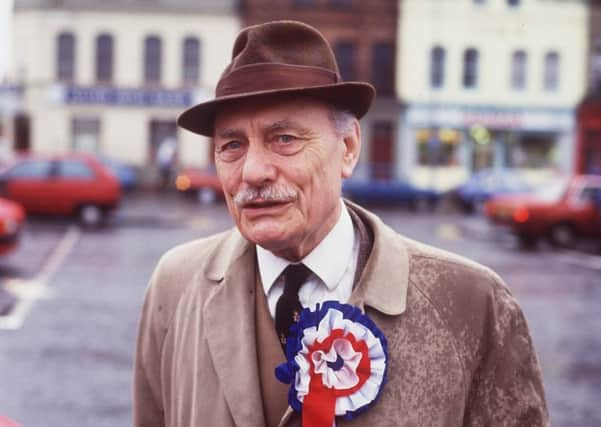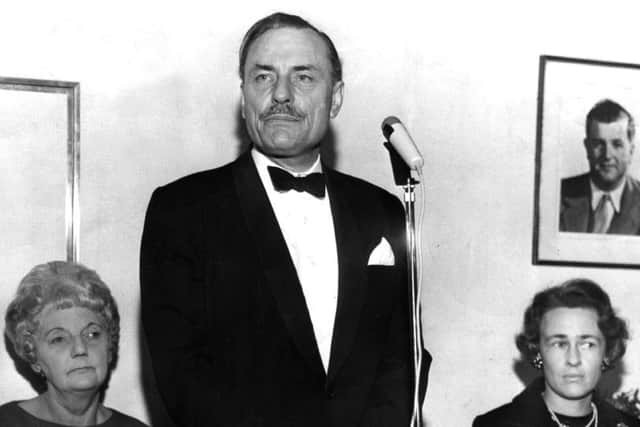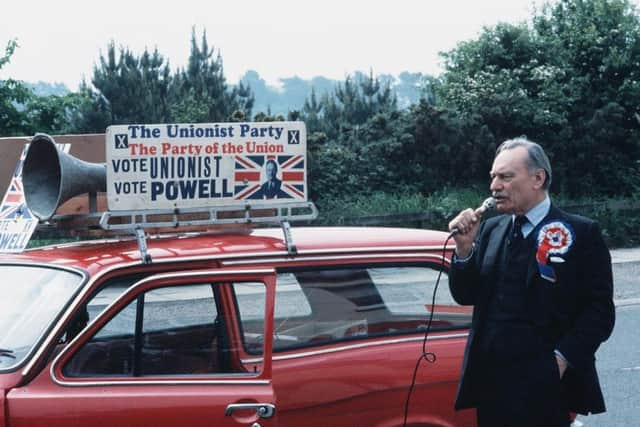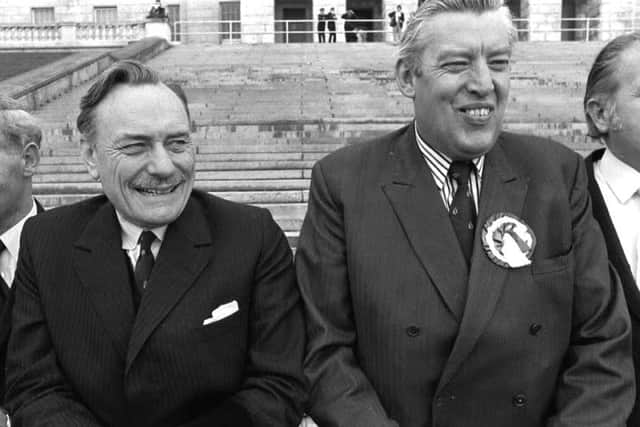Rivers of Blood: Powell's purple language a major misjudgement


Exactly 50 years ago yesterday, British politics witnessed one of the most controversial speeches ever made by a leading politician – John Enoch Powell.
It was a speech which reverberated throughout the political system and it cost Enoch Powell his political career at the top of British politics.
Advertisement
Hide AdAdvertisement
Hide AdIt became known as the “Rivers of Blood” speech and Powell was forever associated with it to the very end of his life.


On Saturday afternoon, April 20, 1968, Enoch Powell addressed the annual general meeting of West Midlands Area Conservative Political Centre at The Midland Hotel in Birmingham.
Powell was a Conservative MP for Wolverhampton South West, having first been elected in 1950.
He was also the Conservative Party’s Shadow Secretary of State for Defence.
Advertisement
Hide AdAdvertisement
Hide AdCopies of his speech had been circulated to some press and media but, crucially, not to Conservative Central Office or the shadow Home Secretary Quinton Hogg, later to become Lord Hailsham.


The theme of Powell’s speech was his concern about the second reading of the 1968 Race Relations Bill shortly to be presented to the House of Commons by the Labour Government and then Home Secretary, James Callaghan.
Powell based his concerns on conversations and correspondence he had received from constituents who were concerned at the influx of immigrants from other parts of the Commonwealth which, they felt, was changing the face of local indigenous communities in the West Midlands and the UK generally.
He gave two examples.
A male constituent had voiced concern that “in this country in 15 or 20 years’ time the black man will have the whip hand over the white man”.


Advertisement
Hide AdAdvertisement
Hide AdPowell then quoted from a letter he had received telling the story of a lady pensioner constituent who had run a guest house locally, but, due to the influx of immigrants, the area profile had changed and she was now afraid to leave her house for fear of racial attack.
The speech was explosive in content.
Not only that, but Powell’s delivery and use of language added to the impact.
Enoch Powell was an acknowledged classical scholar, having learned Greek at his mother’s knee and gone on to be a Fellow of Trinity College Cambridge and a Professor of Greek at the University of Sydney – the youngest in the entire British Empire.


Powell used a classical allusion to Virgil’s Aeneid, declaring, “Like the Roman, I seem to see the River Tiber foaming with much blood”.
Advertisement
Hide AdAdvertisement
Hide AdThe speech, typed by his wife Pamela, had this quotation in Latin – but Powell delivered it in English.
Within hours, Powell was denounced by the media and politicians from all parties including his own, and crucially also by his colleagues in the shadow cabinet, many of whom were demanding his resignation.
Powell was accused of racism. The Conservative party leader Ted Heath, with whom Powell had never enjoyed good relations, sacked him from the shadow cabinet the following day.
If the political response was one of outrage, the public response was different.
Advertisement
Hide AdAdvertisement
Hide AdThere were marches by workers in support of his stance and opinion polls showed majority support for his views.


It was a speech which made him but, paradoxically, it also finished him. It ended any hopes he may have had of rising to the very top of his own party or indeed to lead the nation.
Reading the speech again 50 years on, it is clear to me that Powell made a very serious error of judgement.
The purple language used, the graphic classical allusion (whether in Latin or English) and the terms used, including the description of immigrant children as “charming, wide-grinning piccaninnies” is almost incomprehensible, particularly from a seasoned politician like Powell.
Advertisement
Hide AdAdvertisement
Hide AdHe maintained forever afterwards that it was his “duty” to raise the issue as a Member of Parliament highlighting the fears and concerns of his constituents.
His opponents have always maintained that his speech prevented any public debate on the issue of race to take place in a calm and reasonable manner.
Some felt it was his attempt to seize the leadership of the Conservative Party from Heath and use immigration as the populist issue to achieve this.
The outcome however was otherwise.
Powell never held political office again, although he remained a formidable politician of the very highest intellect.
Advertisement
Hide AdAdvertisement
Hide AdHe left Parliament at the first general election in February 1974 when he famously advocated his supporters to vote for the Labour Party under Harold Wilson (and not Heath or the Conservatives), a decision which is generally accepted to have cost Heath victory.
All through his Westminster career, Enoch had been a close ally of the Ulster Unionist Party in Parliament, and so in the second election of October 1974 he was invited to stand on behalf of the UUP in South Down, replacing the retiring member Captain Lawrence Percy Story Orr, a former chairman of the Westminster Party.
This speech has always fascinated me and many years later I was able to seek answers from the man himself.
Enoch Powell was a gifted and powerful advocate for Unionism at Westminster and a much sought-after speaker in national terms.
Advertisement
Hide AdAdvertisement
Hide AdIn about 1986 he addressed a meeting of Newry & Armagh Young Unionist Association in Markethill.
The room was packed with young and old, keen to hear this legendary political colossus.
Enoch did not disappoint, weaving his magical spell over his audience with his brilliant oratory and compelling speaking voice.
It was the aftermath of the Anglo Irish Agreement and Enoch voiced his clear disapproval of the actions of Margaret Thatcher and the Conservative government.
Then he took questions.
Advertisement
Hide AdAdvertisement
Hide AdWith not inconsiderable courage I pressed him about the 1968 speech and asked if he had regrets?
His initial response was “I should have spoken in the Latin”.
I persisted. He fixed his steely and piercing stare at me. “Young man,” he said, with that famous high voice intonation, “you have the persistence of a radio interviewer, but I regret nothing”.
I look back on it with fondness and almost with a little pride. I had after all challenged the great Enoch Powell!
Controversy on the speech has continued to this very day.
Advertisement
Hide AdAdvertisement
Hide AdSome have regarded it as a legitimate expression of concern by a brave and bold politician who preferred to express his views honestly, even if it meant the end of his career, and who was ultimately proved to be right.
Others believe it to be rabble-rousing of the worst kind, encouraging racist attitudes and playing on the fears and emotions of vulnerable people.
The debate continues.
• Danny Kennedy joined the UUP in 1974. He went on to be elected to the Assembly in 1998, and remained an MLA for Newry and Armagh until losing his seat in 2017.